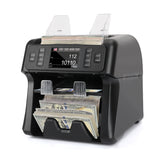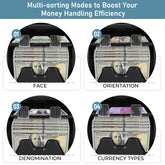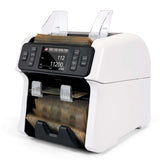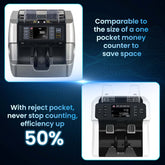What to Do If Merchants Receive Counterfeit U.S. Dollars
The issue of counterfeit currency is a significant concern for businesses of all sizes. In an age where the replication of currency has become increasingly sophisticated, the likelihood of encountering counterfeit U.S. dollars is a real risk that merchants must be prepared to handle. The impact of accepting counterfeit money can be substantial, leading to financial losses and legal complications. This article aims to provide merchants with a comprehensive guide on what to do if they receive counterfeit U.S. dollars. From immediate actions to reporting procedures and prevention strategies, we will explore the essential steps businesses should take to protect themselves against this prevalent issue. With the right knowledge and practices in place, merchants can effectively navigate the challenges posed by counterfeit currency.
Immediate Actions Upon Receiving Counterfeit Money
1. Do Not Return the Bill
Upon identifying a counterfeit bill, the first and foremost rule for a merchant is to not return the bill to the presenter. This practice is crucial for two reasons: firstly, it prevents the further circulation of counterfeit currency; and secondly, it preserves the evidence for the authorities. However, it's important to handle this step carefully to avoid any direct accusations or confrontations with the customer, as they might not be aware of the bill's illegitimacy.
2. Document the Incident
It's essential to document the incident as soon as it's detected. This documentation should include the denomination, serial number, and any unique features of the counterfeit bill. Additionally, note the time of the transaction and, if possible, a description of the person who presented the bill. However, this should be done discreetly to avoid unnecessary confrontation or alarm. Keeping a record of these details is not only helpful for law enforcement but also for the business's internal tracking and security measures.
3. Notify Law Enforcement Immediately
In the event of receiving a counterfeit bill, it's imperative for the merchant to immediately contact local law enforcement. In the United States, this typically means calling the local police department. Reporting the incident as soon as possible is crucial, as it allows law enforcement to respond swiftly, which can be vital in catching the perpetrators and preventing further spread of counterfeit currency. When reporting, provide the officers with all the documented details of the incident, including the counterfeit bill itself, the time of the transaction, and the description of the person who handed over the bill. This prompt action not only aids in a potential investigation but also ensures that the merchant is complying with legal obligations regarding the handling of counterfeit currency.
Which Institutions Have the Authority to Confiscate Counterfeit Currency?
In the United States, the responsibility of dealing with counterfeit currency is shared by several key agencies:
-
United States Secret Service: This agency is the primary entity responsible for the investigation and confiscation of counterfeit money. Originally established to combat counterfeiting, the Secret Service maintains a significant role in protecting the integrity of U.S. currency.
-
Local Law Enforcement Agencies: Local police are typically the first to respond to reports of counterfeit currency at the business level. They collect the counterfeit bills and incident details, which are often forwarded to the Secret Service for further investigation.
-
Federal Reserve: While not interacting directly with the public on counterfeit matters, the Federal Reserve plays a crucial role. They work with financial institutions to identify and remove counterfeit bills from circulation. Banks receiving counterfeit money are required to turn it over to the Federal Reserve, which then coordinates with the Secret Service.
These institutions collectively ensure that counterfeit currency is effectively identified, confiscated, and investigated, thus maintaining the integrity of the U.S. monetary system. Importantly, aside from these authorized entities, no other organizations or individuals have the right to confiscate or retain counterfeit currency. This is a critical point for businesses and individuals to understand, as handling counterfeit money improperly can lead to legal issues and complications.
What Happens If You Try to Spend Counterfeit Money?
Spending counterfeit money is a serious offense and carries significant legal consequences. If someone knowingly tries to pass counterfeit currency as real money, they could face severe penalties, including fines and imprisonment. The law is clear: it's illegal to intentionally pass counterfeit currency in any transaction.
However, the situation can be different for individuals or businesses who unknowingly receive and then spend counterfeit money. In such cases, if they can demonstrate that they were not aware that the currency was fake, they might not face criminal charges. Nonetheless, the financial loss still stands, as counterfeit money has no value and cannot be exchanged for real currency.
Can You Get Compensation from a Bank for a Counterfeit Bill?
Unfortunately, if you end up with a counterfeit bill, you cannot receive compensation from a bank. Banks are required to confiscate any counterfeit currency they come across and hand it over to the appropriate authorities, typically the Secret Service in the United States. When a bank takes a counterfeit bill from you, that bill is removed from circulation, and you will not be reimbursed for its value.
This policy is in place because counterfeit money has no legal value. The aim is to prevent the further spread of counterfeit currency and protect the integrity of the monetary system. As a result, individuals or businesses that inadvertently accept counterfeit money end up bearing the financial loss.
How to Avoid Receiving Counterfeit Money
To safeguard against the risks of counterfeit money, businesses can implement several effective strategies. These measures not only protect against financial losses but also ensure compliance with legal standards. Here are some key approaches:
-
Use Advanced Detection Equipment: Invest in bank-grade money counters with built-in counterfeit detection technologies, such as UV, IR, and CIS technology. These devices provide a reliable way to verify the authenticity of currency.
-
Train Employees Regularly: Conduct regular training sessions for employees to recognize counterfeit bills. This training should cover the identification of security features in legitimate currency, such as watermarks, security threads, and color-shifting inks.
-
Implement Strict Cash Handling Procedures: Establish clear procedures for handling cash transactions. This includes guidelines on how to examine bills and what steps to take when a counterfeit bill is suspected.
-
Utilize Point-of-Sale Verification Tools: Employ point-of-sale tools like counterfeit detection pens and ultraviolet lights. These tools can be used quickly and discreetly during transactions.
-
Stay Informed on Counterfeit Trends: Keep up-to-date with the latest information on counterfeit currency trends. Government agencies, such as the Secret Service and the Federal Reserve, often release updates on new counterfeit methods and security features of new currency designs.
-
Create a Culture of Vigilance: Foster a workplace culture where vigilance against counterfeit money is prioritized. Encourage employees to be attentive and to report any suspicious activity or currency.
Conclusion
In conclusion, dealing with counterfeit U.S. dollars is a challenge that requires vigilance, knowledge, and appropriate action. Understanding the key features of genuine currency, employing the right tools for detection, and knowing the correct procedures for reporting and handling suspected counterfeit money are essential for protecting a business from the financial and legal ramifications of counterfeit currency.








